一般疑问句选择
疑问句大全——_一般疑问句、特殊疑问句、选择疑问句、反意疑问句
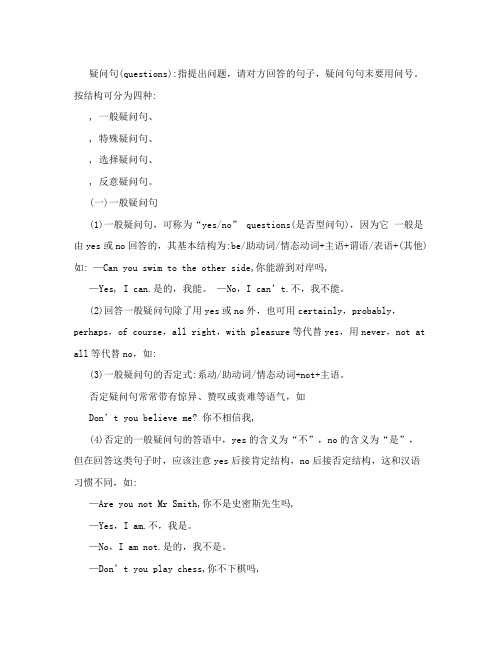
疑问句(questions):指提出问题,请对方回答的句子,疑问句句末要用问号。
按结构可分为四种:, 一般疑问句、, 特殊疑问句、, 选择疑问句、, 反意疑问句。
(一)一般疑问句(1)一般疑问句,可称为“yes/no” questions(是否型问句),因为它一般是由yes或no回答的,其基本结构为:be/助动词/情态动词+主语+谓语/表语+(其他)如: —Can you swim to the other side,你能游到对岸吗,—Yes, I can.是的,我能。
—No,I can’t.不,我不能。
(2)回答一般疑问句除了用yes或no外,也可用certainly,probably,perhaps,of course,all right,with pleasure等代替yes,用never,not at all等代替no,如:(3)一般疑问句的否定式:系动/助动词/情态动词+not+主语。
否定疑问句常常带有惊异、赞叹或责难等语气,如Don’t you believe me? 你不相信我,(4)否定的一般疑问句的答语中,yes的含义为“不”,no的含义为“是”,但在回答这类句子时,应该注意yes后接肯定结构,no后接否定结构,这和汉语习惯不同,如:—Are you not Mr Smith,你不是史密斯先生吗,—Yes,I am.不,我是。
—No,I am not.是的,我不是。
—Don’t you play chess,你不下棋吗,(二)特殊疑问句1、特殊疑问句概述特殊疑问句(special questions),也可称为“wh”-questions,因为它们多数都以who,where,when,which,whose,why这类词开头,它的结构一般为:特殊疑问词+一般疑问句,即:特殊疑问词+be/助动词/情态动词+主语+谓语/表语+(其他),如:What can be done about it,对此能做些什么呢,Which are yours,哪些是你的,Who would like to come for a game of football,谁愿意来踢场足球呀,(三)选择疑问句1、选择疑问句概述选择疑问句(alternative questions)一般提出两种或两种以上的可能,问对方选择哪一种。
一般疑问句、特殊疑问句、选择疑问句
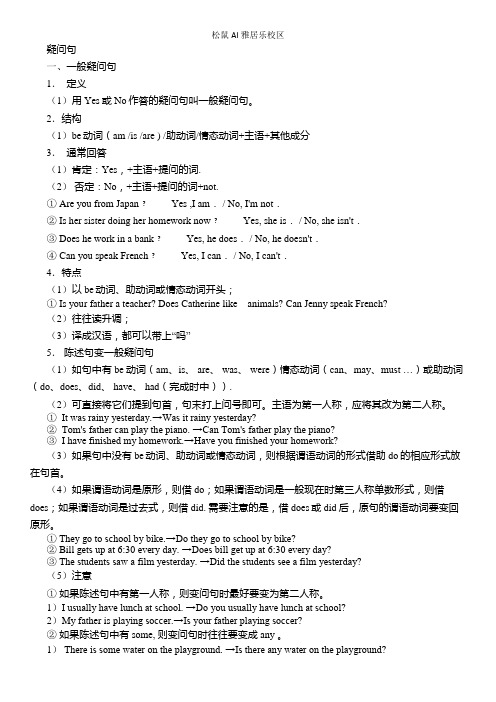
疑问句一、一般疑问句1.定义(1)用Yes或No作答的疑问句叫一般疑问句。
2.结构(1)be动词(am /is /are ) /助动词/情态动词+主语+其他成分3.通常回答(1)肯定:Yes,+主语+提问的词.(2)否定:No,+主语+提问的词+not.① Are you from Japan﹖Yes ,I am. / No, I'm not.② Is her sister doing her homework now﹖Yes, she is. / No, she isn't.③ Does he work in a bank﹖Yes, he does. / No, he doesn't.④ Can you speak French﹖Yes, I can. / No, I can't.4.特点(1)以be动词、助动词或情态动词开头;① Is your father a teacher? Does Catherine like animals? Can Jenny speak French?(2)往往读升调;(3)译成汉语,都可以带上“吗”5.陈述句变一般疑问句(1)如句中有be 动词(am、is、 are、 was、 were)情态动词(can、may、must …)或助动词(do、does、did、 have、 had(完成时中)).(2)可直接将它们提到句首,句末打上问号即可。
主语为第一人称,应将其改为第二人称。
①It was rainy yesterday.→Was it rainy yesterday?②Tom's father can play the piano. →Can Tom's father play the piano?③ I have finished my homework.→Have you finished your homework?(3)如果句中没有be动词、助动词或情态动词,则根据谓语动词的形式借助do的相应形式放在句首。
一般疑问句选答语解题思路
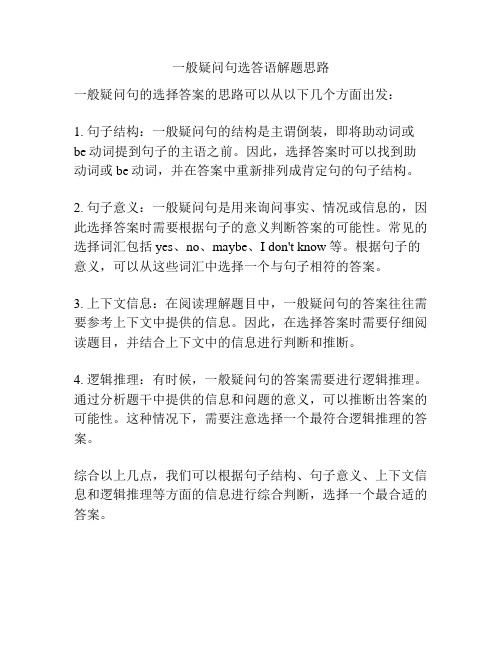
一般疑问句选答语解题思路
一般疑问句的选择答案的思路可以从以下几个方面出发:
1. 句子结构:一般疑问句的结构是主谓倒装,即将助动词或be动词提到句子的主语之前。
因此,选择答案时可以找到助动词或be动词,并在答案中重新排列成肯定句的句子结构。
2. 句子意义:一般疑问句是用来询问事实、情况或信息的,因此选择答案时需要根据句子的意义判断答案的可能性。
常见的选择词汇包括yes、no、maybe、I don't know等。
根据句子的意义,可以从这些词汇中选择一个与句子相符的答案。
3. 上下文信息:在阅读理解题目中,一般疑问句的答案往往需要参考上下文中提供的信息。
因此,在选择答案时需要仔细阅读题目,并结合上下文中的信息进行判断和推断。
4. 逻辑推理:有时候,一般疑问句的答案需要进行逻辑推理。
通过分析题干中提供的信息和问题的意义,可以推断出答案的可能性。
这种情况下,需要注意选择一个最符合逻辑推理的答案。
综合以上几点,我们可以根据句子结构、句子意义、上下文信息和逻辑推理等方面的信息进行综合判断,选择一个最合适的答案。
一般疑问句、选择疑问句的详细用法
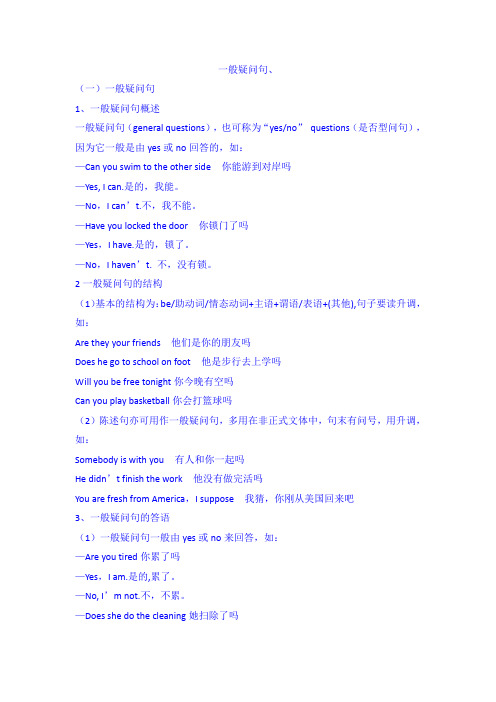
一般疑问句、(一)一般疑问句1、一般疑问句概述一般疑问句(general questions),也可称为“yes/no”questions(是否型问句),因为它一般是由yes或no回答的,如:—Can you swim to the other side 你能游到对岸吗—Yes, I can.是的,我能。
—No,I can’t.不,我不能。
—Have you locked the door 你锁门了吗—Yes,I have.是的,锁了。
—No,I haven’t. 不,没有锁。
2一般疑问句的结构(1)基本的结构为:be/助动词/情态动词+主语+谓语/表语+(其他),句子要读升调,如:Are they your friends 他们是你的朋友吗Does he go to school on foot 他是步行去上学吗Will you be free tonight你今晚有空吗Can you play basketball你会打篮球吗(2)陈述句亦可用作一般疑问句,多用在非正式文体中,句末有问号,用升调,如:Somebody is with you 有人和你一起吗He didn’t finish the work 他没有做完活吗You are fresh from America,I suppose 我猜,你刚从美国回来吧3、一般疑问句的答语(1)一般疑问句一般由yes或no来回答,如:—Are you tired你累了吗—Yes,I am.是的,累了。
—No, I’m not.不,不累。
—Does she do the cleaning她扫除了吗—Yes ,she does.是的,她打扫了。
—No,she doesn’t.不,她没打扫。
(2)回答一般疑问句除了用yes或no外,也可用certainly,probably,perhaps,of course,all right,with pleasure等代替yes,用never,not at all等代替no,如:—Can you help me你能帮个忙吗—Certainly.当然。
一般疑问句总结
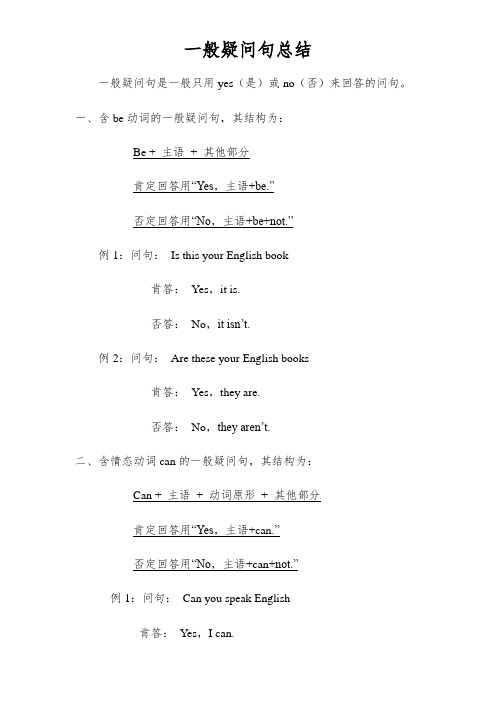
一般疑问句总结一般疑问句是一般只用yes(是)或no(否)来回答的问句。
一、含be动词的一般疑问句,其结构为:Be + 主语+ 其他部分肯定回答用“Yes,主语+be.”否定回答用“No,主语+be+not.”例1:问句:Is this your English book肯答:Yes,it is.否答:No,it isn’t.例2:问句:Are these your English books肯答:Yes,they are.否答:No,they aren’t.二、含情态动词can的一般疑问句,其结构为:Can + 主语+ 动词原形+ 其他部分肯定回答用“Yes,主语+can.”否定回答用“No,主语+can+not.”例1:问句:Can you speak English肯答:Yes,I can.否答:No,I can’t.例2:问句:Can he play football肯答:Yes,he can.否答:No,he can’t.三、含行为动词(或称为实义动词)的一般疑问句,其结构为:Do/Does + 主语+ 动词原形+ 其他部分肯定回答用“Yes, 主语+ do/does.”否定回答用“No, 主语+do/does+not.”例1:问句:Do you like English肯答:Yes,I do.否答:No,I don’t.例2: 问句:Does he go to school by bus肯答:Yes,he does.否答:No,he does not.四、there be句型的一般疑问句,其结构为:Be there + 其他部分肯定回答用“Yes, there be.”否定回答用“No, there be+not.”例1:问句: Is there a river in the forest肯答:Yes,there is.否答:No,there isn’t.例2:问句: Are there any tall buildings in the nature park 肯答:Yes,there are.否答:No,there aren’t.。
一般疑问句 选择疑问句 特殊疑问句
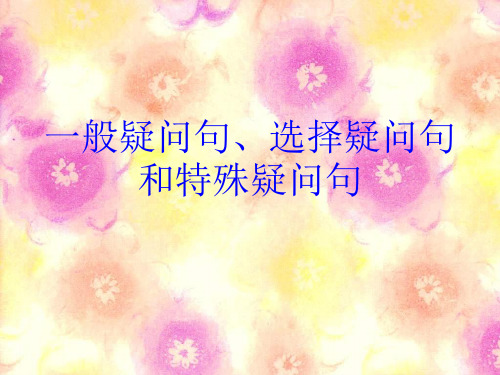
一 一般疑问句 不用疑问词,但需要用yes或no回答的疑 问句,叫一般疑问句。用升调。句末用 问号“?”。
1. be动词的一般疑问句 句型:Be动词+主语~? Is your father angry?你父亲生气了吗? Yes,he is.是的,他生气了。 No,he isn't.不,他没生气。 Are there any birds in the sky? 天空中有鸟吗? Yes,there are.是的,有。 No,there aren词的一般疑问句 句型:情态动词+主语+动词原形~? Can you bring me some apples? 你能给我拿来些苹果吗? Yes,I can.是的,可以。 No,I can't.不,不可以。
3. 一般动词(实义动词)的一般疑问句 句型:Do(Does,Did)+主语+动词原 形~? Does he have supper at home every day? 他每天在家吃饭吗? Yes,he does.是的。 No,he doesn't.不。
二 选择疑问句 提供两种(有时两种以上)情况,要求 对方选择一种的疑问句叫做选择疑问 句.选择疑问句和一般疑问句差不多, 它由两部分组成,中间用or连接,前半 部分用升调读,后半部分用降调读.
构成 一般疑问句+ or +一般疑问句(前后 相同的部分常被省略) 【例】Are you Chinese or Japanese? Is he in Row Two or Row Three?
(4) how“如何”,“怎么样”,对人表示 问候。例如: —How are you, Li Lei? 你好吗,李雷? —Fine, thank you. 我很好,谢谢。
2024年初中英语语法专项复习归纳之选择疑问句与特殊疑问句
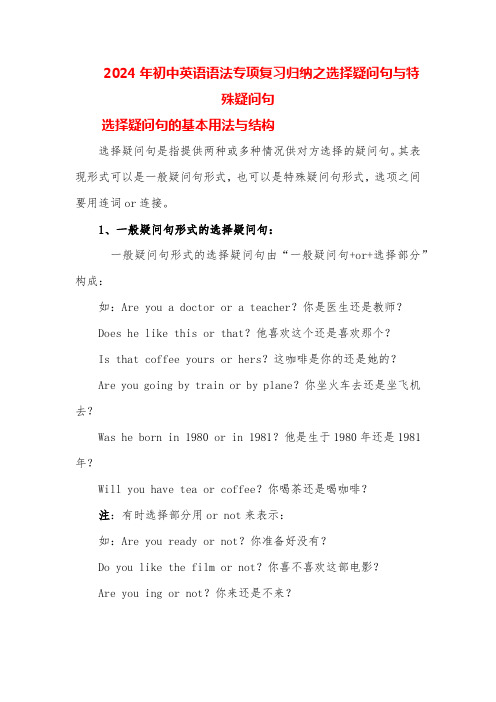
2024年初中英语语法专项复习归纳之选择疑问句与特殊疑问句选择疑问句的基本用法与结构选择疑问句是指提供两种或多种情况供对方选择的疑问句。
其表现形式可以是一般疑问句形式,也可以是特殊疑问句形式,选项之间要用连词or连接。
1、一般疑问句形式的选择疑问句:一般疑问句形式的选择疑问句由“一般疑问句+or+选择部分”构成:如:Are you a doctor or a teacher?你是医生还是教师?Does he like this or that?他喜欢这个还是喜欢那个?Is that coffee yours or hers?这咖啡是你的还是她的?Are you going by train or by plane?你坐火车去还是坐飞机去?Was he born in 1980 or in 1981?他是生于1980年还是1981年?Will you have tea or coffee?你喝茶还是喝咖啡?注:有时选择部分用or not来表示:如:Are you ready or not?你准备好没有?Do you like the film or not?你喜不喜欢这部电影?Are you ing or not?你来还是不来?2、特殊疑问句形式的选择疑问句:特殊疑问句形式的选择疑问句由“特殊疑问句,选项A+or+选项B”:如:Which would you like, tea or coffee?你想要哪样,是茶还是咖啡?Who runs faster, you or Tom?你和汤姆谁跑得快一点?When shall we leave, today or tomorrow?我们什么时候离开,今天还是明天?How long did he live there, five years or ten years?他在那儿住了多久,是5年还是10年?How shall we go, on foot or by bus?我们怎么去,走路去还是坐公共汽车去?选择疑问句的概念:选择疑问句是说话者对问题提出两个或两个以上的答案,供对方选择其一。
一般疑问句、选择疑问句的详细用法
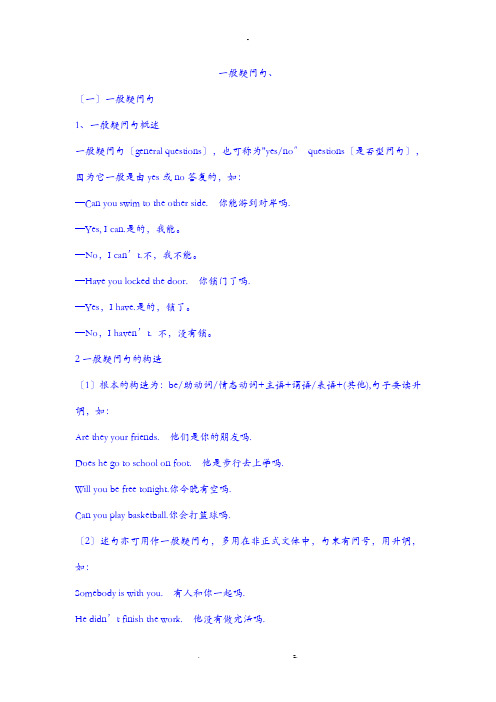
一般疑问句、〔一〕一般疑问句1、一般疑问句概述一般疑问句〔general questions〕,也可称为"yes/no〞questions〔是否型问句〕,因为它一般是由yes或no答复的,如:—Can you swim to the other side. 你能游到对岸吗.—Yes, I can.是的,我能。
—No,I can’t.不,我不能。
—Have you locked the door. 你锁门了吗.—Yes,I have.是的,锁了。
—No,I haven’t. 不,没有锁。
2一般疑问句的构造〔1〕根本的构造为:be/助动词/情态动词+主语+谓语/表语+(其他),句子要读升调,如:Are they your friends. 他们是你的朋友吗.Does he go to school on foot. 他是步行去上学吗.Will you be free tonight.你今晚有空吗.Can you play basketball.你会打篮球吗.〔2〕述句亦可用作一般疑问句,多用在非正式文体中,句末有问号,用升调,如:Somebody is with you. 有人和你一起吗.He didn’t finish the work. 他没有做完活吗.You are fresh from America,I suppose. 我猜,你刚从美国回来吧.3、一般疑问句的答语〔1〕一般疑问句一般由yes或no来答复,如:—Are you tired.你累了吗.—Yes,I am.是的,累了。
—No, I’m not.不,不累。
—Does she do the cleaning.她扫除了吗.—Yes ,she does.是的,她清扫了。
—No,she doesn’t.不,她没清扫。
〔2〕答复一般疑问句除了用yes或no外,也可用certainly,probably,perhaps,of course,all right,with pleasure等代替yes,用never,not at all等代替no,如:—Can you help me.你能帮个忙吗.—Certainly.当然。
一般疑问句、选择疑问句的详细用法
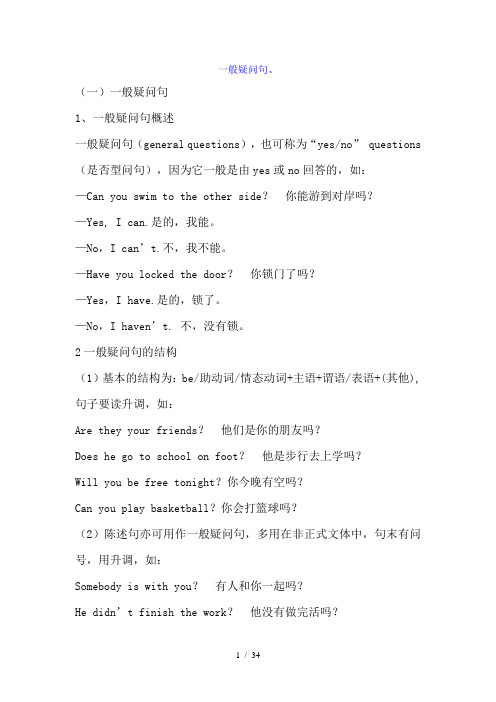
一般疑问句、(一)一般疑问句1、一般疑问句概述一般疑问句(general questions),也可称为“yes/no” questions (是否型问句),因为它一般是由yes或no回答的,如:—Can you swim to the other side?你能游到对岸吗?—Yes, I can.是的,我能。
—No,I can’t.不,我不能。
—Have you locked the door?你锁门了吗?—Yes,I have.是的,锁了。
—No,I haven’t. 不,没有锁。
2一般疑问句的结构(1)基本的结构为:be/助动词/情态动词+主语+谓语/表语+(其他),句子要读升调,如:Are they your friends?他们是你的朋友吗?Does he go to school on foot?他是步行去上学吗?Will you be free tonight?你今晚有空吗?Can you play basketball?你会打篮球吗?(2)陈述句亦可用作一般疑问句,多用在非正式文体中,句末有问号,用升调,如:Somebody is with you?有人和你一起吗?He didn’t finish the work?他没有做完活吗?You are fresh from America,I suppose?我猜,你刚从美国回来吧?3、一般疑问句的答语(1)一般疑问句一般由yes或no来回答,如:—Are you tired?你累了吗?—Yes,I am.是的,累了。
—No, I’m not.不,不累。
—Does she do the cleaning?她扫除了吗?—Yes ,she does.是的,她打扫了。
—No,she doesn’t.不,她没打扫。
(2)回答一般疑问句除了用yes或no外,也可用certainly,probably,perhaps,of course,all right,with pleasure等代替yes,用never,not at all等代替no,如:—Can you help me?你能帮个忙吗?—Certainly.当然。
小学英语语法详解疑问句-选择疑问句、特殊疑问句、一般疑问句、否定句、
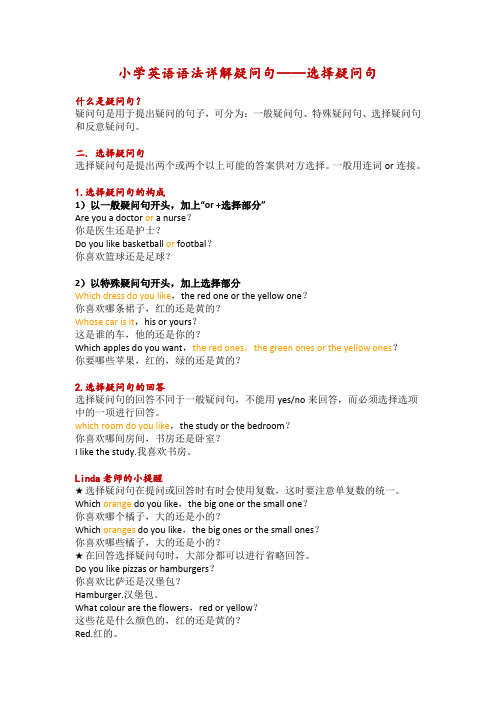
什么是疑问句?疑问句是用于提出疑问的句子,可分为:一般疑问句、特殊疑问句、选择疑问句和反意疑问句。
二. 选择疑问句选择疑问句是提出两个或两个以上可能的答案供对方选择。
一般用连词or连接。
1.选择疑问句的构成1)以一般疑问句开头,加上“or +选择部分”Are you a doctor or a nurse?你是医生还是护士?Do you like basketball or footbal?你喜欢篮球还是足球?2)以特殊疑问句开头,加上选择部分Which dress do you like,the red one or the yellow one?你喜欢哪条裙子,红的还是黄的?Whose car is it,his or yours?这是谁的车,他的还是你的?Which apples do you want,the red ones,the green ones or the yellow ones?你要哪些苹果,红的,绿的还是黄的?2.选择疑问句的回答选择疑问句的回答不同于一般疑问句,不能用yes/no来回答,而必须选择选项中的一项进行回答。
which room do you like,the study or the bedroom?你喜欢哪间房间,书房还是卧室?I like the study.我喜欢书房。
Linda老师的小提醒★选择疑问句在提问或回答时有时会使用复数,这时要注意单复数的统一。
Which orange do you like,the big one or the small one?你喜欢哪个橘子,大的还是小的?Which oranges do you like,the big ones or the small ones?你喜欢哪些橘子,大的还是小的?★在回答选择疑问句时,大部分都可以进行省略回答。
Do you like pizzas or hamburgers?你喜欢比萨还是汉堡包?Hamburger.汉堡包。
一般疑问句与选择疑问句的四不同
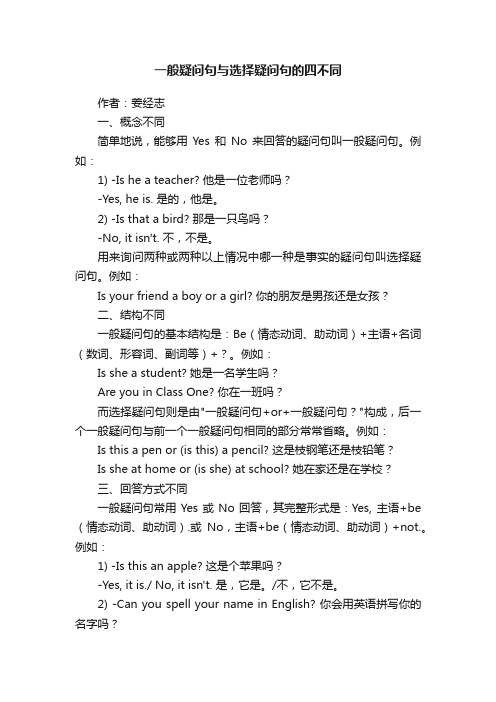
一般疑问句与选择疑问句的四不同作者:姜经志一、概念不同简单地说,能够用Yes和No来回答的疑问句叫一般疑问句。
例如:1) -Is he a teacher? 他是一位老师吗?-Yes, he is. 是的,他是。
2) -Is that a bird? 那是一只鸟吗?-No, it isn't. 不,不是。
用来询问两种或两种以上情况中哪一种是事实的疑问句叫选择疑问句。
例如:Is your friend a boy or a girl? 你的朋友是男孩还是女孩?二、结构不同一般疑问句的基本结构是:Be(情态动词、助动词)+主语+名词(数词、形容词、副词等)+?。
例如:Is she a student? 她是一名学生吗?Are you in Class One? 你在一班吗?而选择疑问句则是由"一般疑问句+or+一般疑问句?"构成,后一个一般疑问句与前一个一般疑问句相同的部分常常省略。
例如:Is this a pen or (is this) a pencil? 这是枝钢笔还是枝铅笔?Is she at home or (is she) at school? 她在家还是在学校?三、回答方式不同一般疑问句常用Yes或No回答,其完整形式是:Yes, 主语+be (情态动词、助动词).或No,主语+be(情态动词、助动词)+not.。
例如:1) -Is this an apple? 这是个苹果吗?-Yes, it is./ No, it isn't. 是,它是。
/不,它不是。
2) -Can you spell your name in English? 你会用英语拼写你的名字吗?-Yes, I can./ No, I can't. 是的,我会。
/不,我不会。
选择疑问句的回答不能用Yes或No,而要根据事实从两者中选一种来回答。
例如:1) -Is that a car or a bus? 那是辆小汽车还是辆公共汽车?-It's a car. 是辆小汽车。
一般疑问句、特殊疑问句、选择疑问句、反义疑问句的详细用法
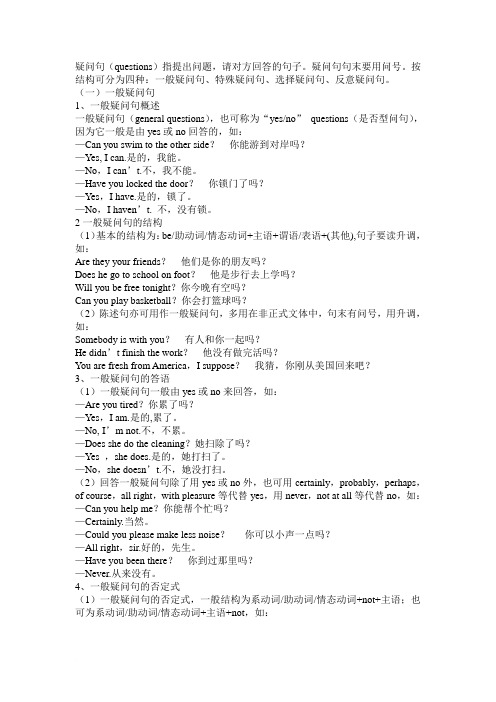
疑问句(questions)指提出问题,请对方回答的句子。
疑问句句末要用问号。
按结构可分为四种:一般疑问句、特殊疑问句、选择疑问句、反意疑问句。
(一)一般疑问句1、一般疑问句概述一般疑问句(general questions),也可称为“yes/no”questions(是否型问句),因为它一般是由yes或no回答的,如:—Can you swim to the other side?你能游到对岸吗?—Yes, I can.是的,我能。
—No,I can’t.不,我不能。
—Have you locked the door?你锁门了吗?—Yes,I have.是的,锁了。
—No,I haven’t. 不,没有锁。
2一般疑问句的结构(1)基本的结构为:be/助动词/情态动词+主语+谓语/表语+(其他),句子要读升调,如:Are they your friends?他们是你的朋友吗?Does he go to school on foot?他是步行去上学吗?Will you be free tonight?你今晚有空吗?Can you play basketball?你会打篮球吗?(2)陈述句亦可用作一般疑问句,多用在非正式文体中,句末有问号,用升调,如:Somebody is with you?有人和你一起吗?He didn’t finish the work?他没有做完活吗?You are fresh from America,I suppose?我猜,你刚从美国回来吧?3、一般疑问句的答语(1)一般疑问句一般由yes或no来回答,如:—Are you tired?你累了吗?—Yes,I am.是的,累了。
—No, I’m not.不,不累。
—Does she do the cleaning?她扫除了吗?—Yes ,she does.是的,她打扫了。
—No,she doesn’t.不,她没打扫。
(2)回答一般疑问句除了用yes或no外,也可用certainly,probably,perhaps,of course,all right,with pleasure等代替yes,用never,not at all等代替no,如:—Can you help me?你能帮个忙吗?—Certainly.当然。
一般疑问句、特殊疑问句、选择疑问句、反义疑问句的详细用法

疑问句(questions)指提出问题,请对方回答的句子。
疑问句句末要用问号。
按结构可分为四种:一般疑问句、特殊疑问句、选择疑问句、反意疑问句。
(一)一般疑问句1、一般疑问句概述一般疑问句(general questions),也可称为“yes/no”questions(是否型问句),因为它一般是由yes或no回答的,如:—Can you swim to the other side?你能游到对岸吗?—Yes, I can.是的,我能。
—No,I can’t.不,我不能。
—Have you locked the door?你锁门了吗?—Yes,I have.是的,锁了。
—No,I haven’t. 不,没有锁。
2一般疑问句的结构(1)基本的结构为:be/助动词/情态动词+主语+谓语/表语+(其他),句子要读升调,如:Are they your friends?他们是你的朋友吗?Does he go to school on foot?他是步行去上学吗?Will you be free tonight?你今晚有空吗?Can you play basketball?你会打篮球吗?(2)陈述句亦可用作一般疑问句,多用在非正式文体中,句末有问号,用升调,如:Somebody is with you?有人和你一起吗?He didn’t finish the work?他没有做完活吗?You are fresh from America,I suppose?我猜,你刚从美国回来吧?3、一般疑问句的答语(1)一般疑问句一般由yes或no来回答,如:—Are you tired?你累了吗?—Yes,I am.是的,累了。
—No, I’m not.不,不累。
—Does she do the cleaning?她扫除了吗?—Yes ,she does.是的,她打扫了。
—No,she doesn’t.不,她没打扫。
(2)回答一般疑问句除了用yes或no外,也可用certainly,probably,perhaps,of course,all right,with pleasure等代替yes,用never,not at all等代替no,如:—Can you help me?你能帮个忙吗?—Certainly.当然。
疑问句大全—— 一般疑问句、特殊疑问句、选择疑问句、反意疑问句
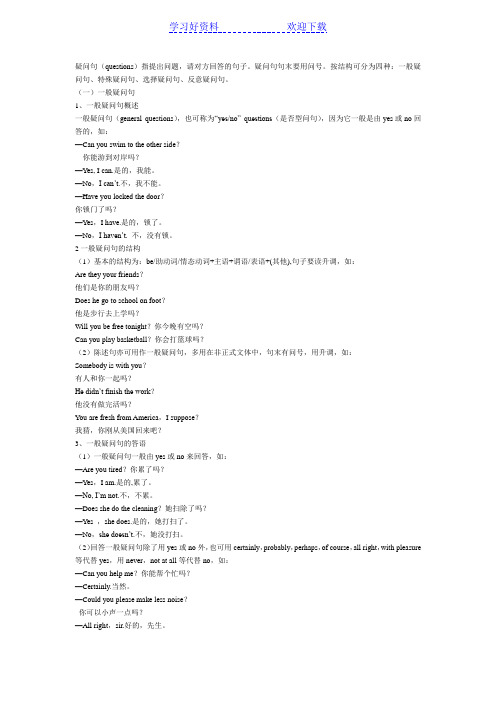
疑问句(questions)指提出问题,请对方回答的句子。
疑问句句末要用问号。
按结构可分为四种:一般疑问句、特殊疑问句、选择疑问句、反意疑问句。
(一)一般疑问句1、一般疑问句概述一般疑问句(general questions),也可称为“yes/no” questions(是否型问句),因为它一般是由yes或no回答的,如:—Can you swim to the other side?你能游到对岸吗?—Yes, I can.是的,我能。
—No,I can’t.不,我不能。
—Have you locked the door?你锁门了吗?—Yes,I have.是的,锁了。
—No,I haven’t. 不,没有锁。
2一般疑问句的结构(1)基本的结构为:be/助动词/情态动词+主语+谓语/表语+(其他),句子要读升调,如:Are they your friends?他们是你的朋友吗?Does he go to school on foot?他是步行去上学吗?Will you be free tonight?你今晚有空吗?Can you play basketball?你会打篮球吗?(2)陈述句亦可用作一般疑问句,多用在非正式文体中,句末有问号,用升调,如:Somebody is with you?有人和你一起吗?He didn’t finish the work?他没有做完活吗?You are fresh from America,I suppose?我猜,你刚从美国回来吧?3、一般疑问句的答语(1)一般疑问句一般由yes或no来回答,如:—Are you tired?你累了吗?—Yes,I am.是的,累了。
—No, I’m not.不,不累。
—Does she do the cleaning?她扫除了吗?—Yes ,she does.是的,她打扫了。
—No,she doesn’t.不,她没打扫。
疑问句大全—— 一般疑问句、特殊疑问句、选择疑问句、反意疑问句
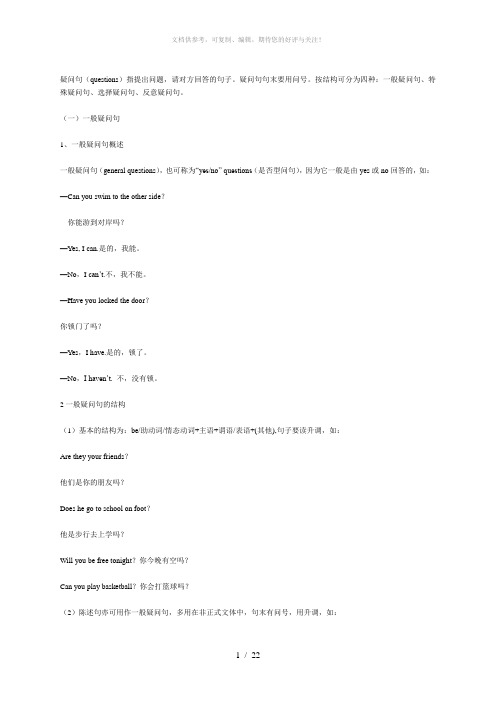
疑问句(questions)指提出问题,请对方回答的句子。
疑问句句末要用问号。
按结构可分为四种:一般疑问句、特殊疑问句、选择疑问句、反意疑问句。
(一)一般疑问句1、一般疑问句概述一般疑问句(general questions),也可称为“yes/no” questions(是否型问句),因为它一般是由yes或no回答的,如:—Can you swim to the other side?你能游到对岸吗?—Yes, I can.是的,我能。
—No,I can’t.不,我不能。
—Have you locked the door?你锁门了吗?—Yes,I have.是的,锁了。
—No,I haven’t. 不,没有锁。
2一般疑问句的结构(1)基本的结构为:be/助动词/情态动词+主语+谓语/表语+(其他),句子要读升调,如:Are they your friends?他们是你的朋友吗?Does he go to school on foot?他是步行去上学吗?Will you be free tonight?你今晚有空吗?Can you play basketball?你会打篮球吗?(2)陈述句亦可用作一般疑问句,多用在非正式文体中,句末有问号,用升调,如:Somebody is with you?有人和你一起吗?He didn’t finish the work?他没有做完活吗?You are fresh from America,I suppose?我猜,你刚从美国回来吧?3、一般疑问句的答语(1)一般疑问句一般由yes或no来回答,如:—Are you tired?你累了吗?—Yes,I am.是的,累了。
—No, I’m not.不,不累。
—Does she do the cleaning?她扫除了吗?—Yes ,she does.是的,她打扫了。
—No,she doesn’t.不,她没打扫。
- 1、下载文档前请自行甄别文档内容的完整性,平台不提供额外的编辑、内容补充、找答案等附加服务。
- 2、"仅部分预览"的文档,不可在线预览部分如存在完整性等问题,可反馈申请退款(可完整预览的文档不适用该条件!)。
- 3、如文档侵犯您的权益,请联系客服反馈,我们会尽快为您处理(人工客服工作时间:9:00-18:30)。
选择正确的答案一般疑问句(一)
( )1、Can I try it on? A、Yes, we do.
( )2、Is the dress yours? B、No, it isn`t. It`s the.playground. ( )3、Are the pants Mike`s? C、Of course.
( )4、Can I go outside now? D、No, they aren`t. They are John`s. ( )5、Do you have a library? E、Yes, you can. It`s warm and sunny. ( )6、Is this the gym? F、Yes, it`s mine.
选择正确的答案一般疑问句(二)
( )1、Are these carrots? A、No, you can`t .It`s cold and snowy. ( )2、Can I help you ? B、Yes, it is.
( )3、Are the gloves yours? C、Yes, they are.
( )4、Can I go outside now? D、Yes, we do.
( )5、Do you have a library? E、Yes, the scarf is pretty.
( )6、Is the hat Chen Jie`s? F、Yes, they are mine.
选择正确的答案一般疑问句(三)
( )1、Can I help you? A、No, they aren`t. They`re goats. ( )2、Are the sunglasses yours? B、Yes, you can. It`s sunny. ( )3、Are those sheep? C、No, it isn`t. It`s teacher`s office. ( )4、Can I go outside now? D、Yes, they are. They are mine. ( )5、Is this the teacher`s office? E、Sure, here you are.
( )6、Can I try them on? F、Yes, the umbrella is pretty.
选择正确的答案一般疑问句(四)
( )1、Are those tomatoes ? A、Yes, we do.
( )2、Is the coat yours ,Mum? B、Of course, here you are.
( )3、Can I go outside now? C、No, it isn`t .It`s your father`s.
( )4、Do you have an art room? D、Yes, the skirt is nice.
( )5、Can I try on the dress? E、No, they aren`t . They are potatoes. ( )6、Can I help you? F、No, you can`t. It`s rainy outside.
选择正确的答案一般疑问句(五)
( )1、Are these shorts Amy`s? A、Sure, here you are.
( )2、Is that shirt Zhang Peng`s? B、Yes, we do.
( )3、Are those horses? C、No, they aren`t. They are Mary`s. ( )4、Can I try on the shoes? D、Yes, they are horses.
( )5、Do you have a garden? E、Yes, you can. It`s warm outside. ( )6、Can I go outside now? F、Yes, it is.
选择正确的答案一般疑问句(六)
( )1、Is the scarf expensive? A、No, they aren`t. They are my sister`s ( )2、Can I go outside now? B、Yes, I want some apples.
( )3、Are those hens? C、Yes, it is. It`s Sarah`s.
( )4、Is the hat Sarah`s? D、Yes it is .It`s too expensive.
( )5、Are the socks yours? E、No, they aren`t. They are ducks. ( )6、Can I help you? F、No, you can`t. It`s cold and outside.。
